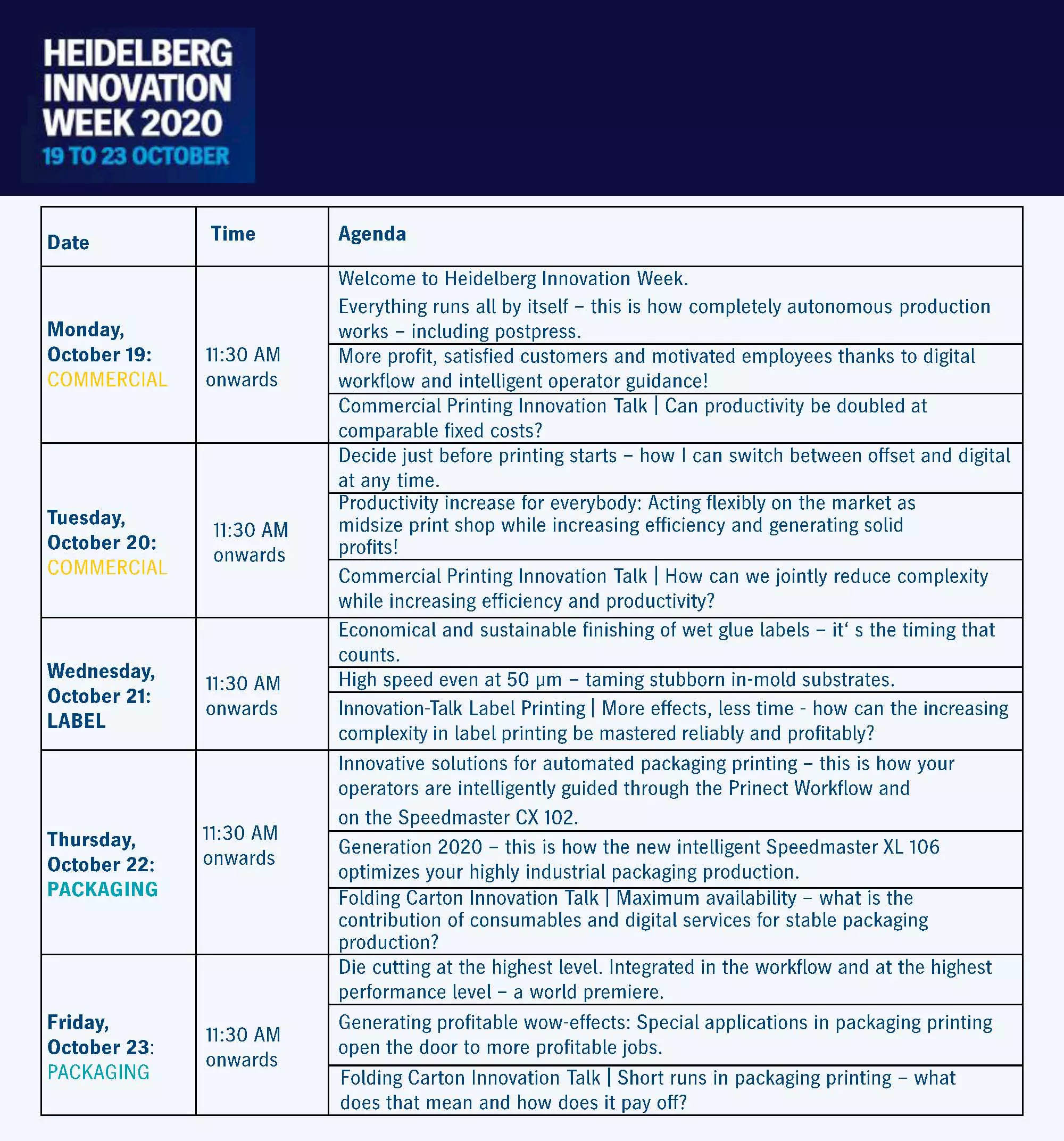Day four of Heidelberg Innovation Week: Contribution of consumables and digital services in packaging
The availability of a machine directly impacts productivity. How do intelligent data based services such as the new Maintenance Manager, Performance Analysis and Digital Training affect total performance? What is the role of coordinated consumables, service contracts and optimal maintenance management for stable production at consistently high quality? Charmiane Alexander reports
23 Oct 2020 | By Charmiane Alexander
The above topics were discussed on the fourth day of the Heidelberg Innovation Week. The discussion was hosted by Yasmine Blair with Elke Steinbach, head of product management contracts and Gregory Frech, product manager service on the panel.
Yasmine Blair (YB): The availability of a machine directly impacts the productivity and this is especially true when it comes to packaging production. So factors like maintenance, production resources, seamless processes, all of these play a very large role and a very important one. How can I manage these tasks plus maintain an overview at the same time?
Elke Steinbach (ES): So what you said is right, we need to have transparency and information to take the right decisions and to manage a company successfully. We want to help our customers to gain this information. And to have an overview at one glance, we have designed our digital platform – the Heidelberg Assistant. It is a portal where customers can access information around their print shop.
YB: So what type of information does the digital platform contain?
ES: You can find different services and information. It contains a big knowledge database, service status of the equipment. You can see activities around predictive monitoring, and also see a lot of performance data, which is very important. You can post service notifications, and follow them up directly on this platform and see the entire service history. There is a link to the eShop where you can find pre-configured coordinated consumables that fit your equipment. You can get an overview of invoices and contracts. The good news is, more and more services are coming in.
Gregory Frech (GF): And we have to say a lot of customers are using that already. We have 1,300 customers already. So as I said, it's growing big, and being loved by our customers already.
YB: So when you say loved by your customers, what has the feedback been like so far? What are your customers saying?
ES: They really love it. ... To get all the information at a glance and to have just one log in and find so many different applications and services that you can access. So we think we are on the right path with it.
GF: Our customers use the Heidelberg Assistant even when they are not in the print shop. They use the smartphone to have a look at what is happening in the plant. You have the information in your hand and you actually use it as a print shop manager, production manager.

YB: Which of my company's performance figures have I got in view with the Heidelberg Assistant - and what does that look like in practice?
ES: With the Heidelberg, Assistant, if you start with the start screen, you go directly into the performance charts. And here you can have nice graphical overviews of the performance KPIs of your machines, you can choose the machine, you can see data about the overall equipment efficiency (OEE), you can see net productivity, run length, waste, all the different key performance figures across time, for the different machines. You can compare two different periods, you can get data tables, so you can really get a deep insight. And then the next step is performance benchmarking.
One thing is to know how the machines are performing, or production is performing over time. But only when I compare myself to the rest of the world, then I can really understand where I stand – am I in a good position or is there room for improvement? We have this performance benchmarking solution, where we get a lot of anonymous job data from all the different machines, which are connected to the cloud. I can say there are nearly 20 million jobs per year, which go in there. So you can really have fun. And this is organised by job clusters.
So the customer can see his own jobs, compare those with jobs produced in different regions in the world. As a printing company, you can look at the past data and see how you have developed? What’s doing great or areas which need improvement. You can strategise – you have certain strength in a certain job cluster, then maybe you want to go and acquire more of those or if you see where your weaknesses are, where the efficiency is not so high, then you can work on it and improve it and gain more there.
YB: The number itself is not very valuable, but the interpretation is. So what support can I actually access in order to analyse all of these figures we've been talking about? How can I draw the correct conclusions? Do you actually offer some sort of support for your customers?
GF: You're perfectly right. The figure is not everything you have to get the right measure out of it. There’s online support and experts are a telephone call away. These experts have studied many print shops. They can let you know the right lever to adjust in order to get better results. Not just that, we offer evaluation at the print shop too. And this goes even to projects we do together with our customers, which then runs over a year. Sometimes there are small things you miss – the inappropriate material use or the blade is coming too late.
YB: You support your customers you have developed something new – the digital consultant
GF: It is called Performance Advisor Technology or the PAT. The PAT is able to analyse the machine – how machines react to problems. And depending on that data, we suggest measures which could be carried out by customers or by Heidelberg engineers.
YB: Now to perform well, the machine must naturally be available, it must not fail unexpectedly, what is the key to prevent the machine from failing?
GF: Everybody knows how bad that is. You need the right personnel. You need the right expert to fix your machine. You need the right parts. Heidelberg is here for you. With 2,000 experts worldwide, even the Coronavirus did not hold us back. We have logistics centres with stocked up spare parts.

At the Innovation Week 2020, we are proud to introduce our new cloud application tool – Maintenance Manager. We have designed a complete digital workflow. We collect all your check points. A service technician or an operator can fill out the machine information with detailed description, pictures and so on. This is stored in the system and gives you the complete maintenance history. With this tool, you are able to plan your maintenance according to our production profile. I call it – condition-based maintenance. It’s a very important tool for packaging converters who have to face audits.
We plan to roll out the Maintenance Manager application at the beginning of next year.
YB: We have established 24x7 availability. But besides that, performance also depends on well-trained staff and a well-trained team in the press room. So how can I obtain qualifications for my operators? What's your solution to that?
GF: If your operator is not performing, you don't get the output from the machine. So we offer a complete portfolio here – online seminars, training in the factory.
We offer a new product, which is called Digital Training. This is also a module in the Heidelberg Assistant. So how does it work? We deliver eLearning modules to our customers, which can be accessed anytime, anywhere on a smartphone, which is an important content, fitting to the applications of the customer. Helping him out with topics he may not have every day, like adjusting the rollers or reducing waste. The best thing is, we always update the content. So we will be able to train your staff.
YB: Now, apart from the team, the consumables also play a very important role when it comes to production and overall performance. Why is this the case? How do you ensure that your customers have the correct materials. Do you also have a special way of helping them out here?
ES: When it comes to consumables, it's very important to pick the right one or the right combination of different consumables to run a smooth production schedule. To do that one needs to test different combinations of consumables. Here, Heidelberg can save the customers this task because we test consumables on actual machine modules when we produce them.
GF: If a customer has a problem in the print shop, they do not know whom to blame – the press manufacturer, the plate manufacturer or the ink and chemical manufacturers. Heidelberg is really supporting the customers by solving their problems by delivering everything.

ES: And we also have the application specialists, people who know a lot about how to apply the best consumables for the dedicated applications, which are a broad range as well. And this is the service we can offer to our customers. So for example, we could decrease washing times by combining the blankets and the rollers with the press room chemistry in a good way. And this will immediately have a positive effect on the press performance.
As a company with global presence, we can offer solutions to our customers in any part of the world.
Recently, we had a case where a customer of ours produced a special packaging. It would normally be done in China, but this time he had to produce it in Canada. So, the portfolios may differ from country to country a bit. However, we were able to provide the exact coating blankets and other consumables for this job in Canada. So the exact effects in gloss and everything could be reproduced.
YB: The Heidelberger system contains, everything required for the digital management of a smart print shop. On what terms can I use this service? Is it available for everyone?
ES: Yes. So at first the Heidelberg Assistant solution is free to all our customers. The dedicated solutions and services that are contained in the Heidelberg Assistant are accessible via contract offers too. And for that, we have also rearranged our contract portfolio under the headline of print site contracts.
YB: So what is part of the print site contracts or what possibilities do your customers have?
ES: The print site contracts start from a service agreement and then we have combined the service agreements with our consumable offers. You can add on the software, the Prinect software we offer and the consulting and training services we have even up to the machine so that there is a range from the basis to the top. And we of course know that each customer is very individual and has different requirements. So are our printed contracts. So you we start the discussion together, as we want to start a partnership with our customer. And it's the idea of having this portfolio where we can combine and package the dedicated services and products together as the customer needs it.
YB: So there are many different variations, not just one-two-three models, but very individualised models? So your customers are happy, and Heidelberg is too?
ES: Exactly. All of the benefits that we can combine with the print site contracts – the transparency you get through all the data inside the cost, the increased availability through the best choice of coordinated services and consumables. With our performance and consulting services, we can help increase the performance of the whole print shop. All of this together, we are sure, will increase the profitability of our customers.












 See All
See All